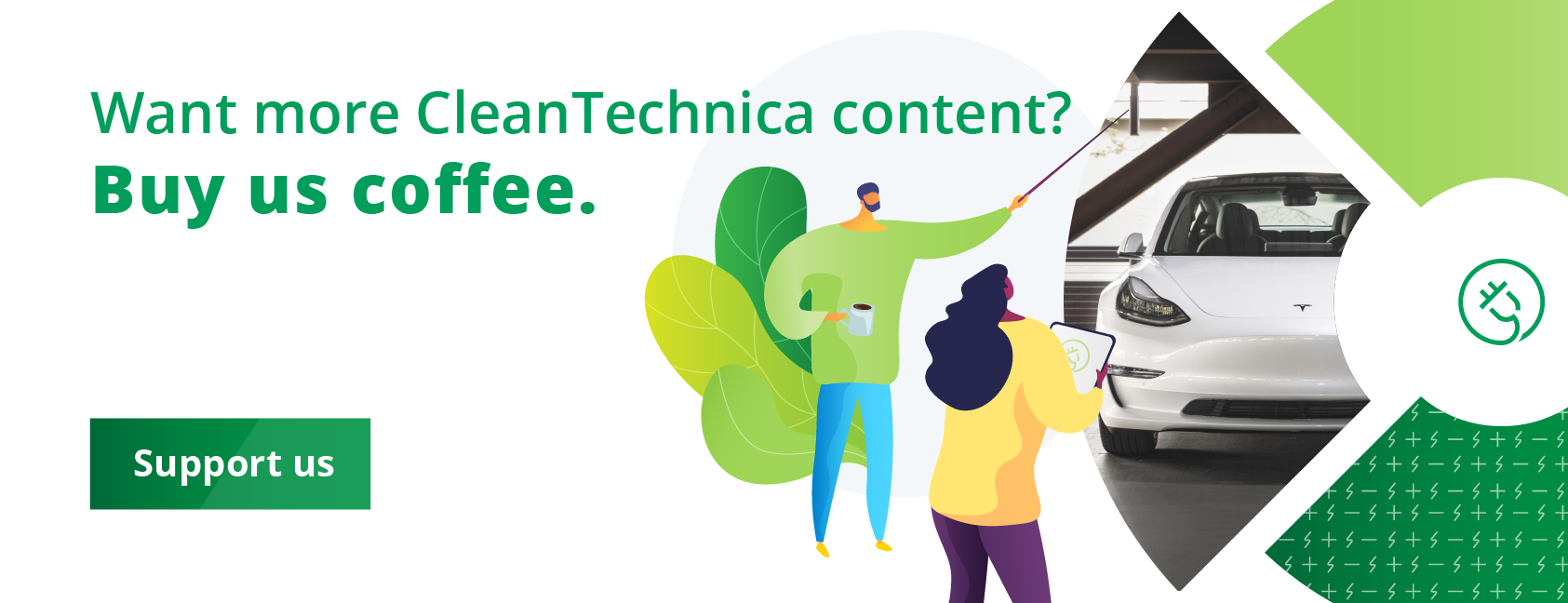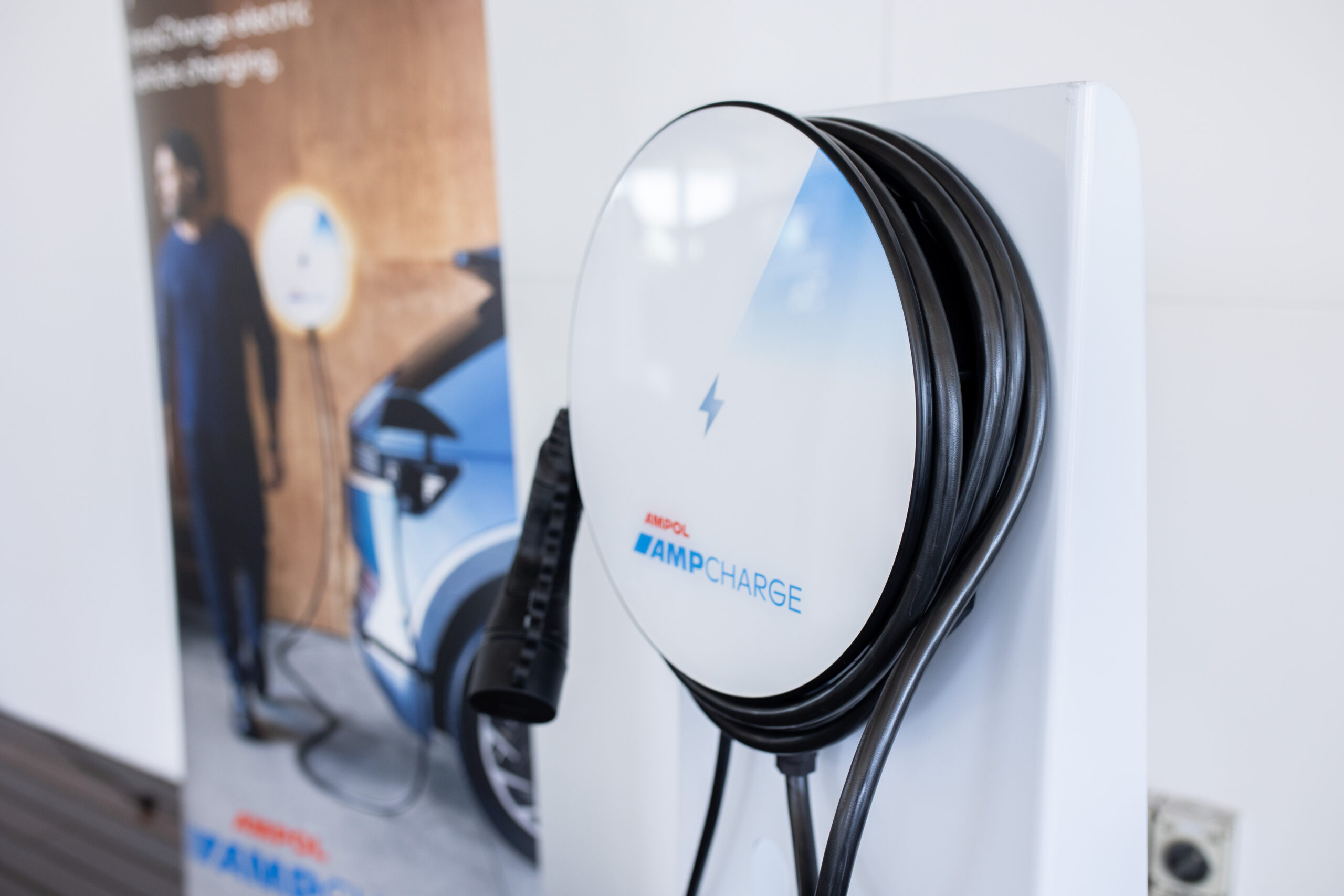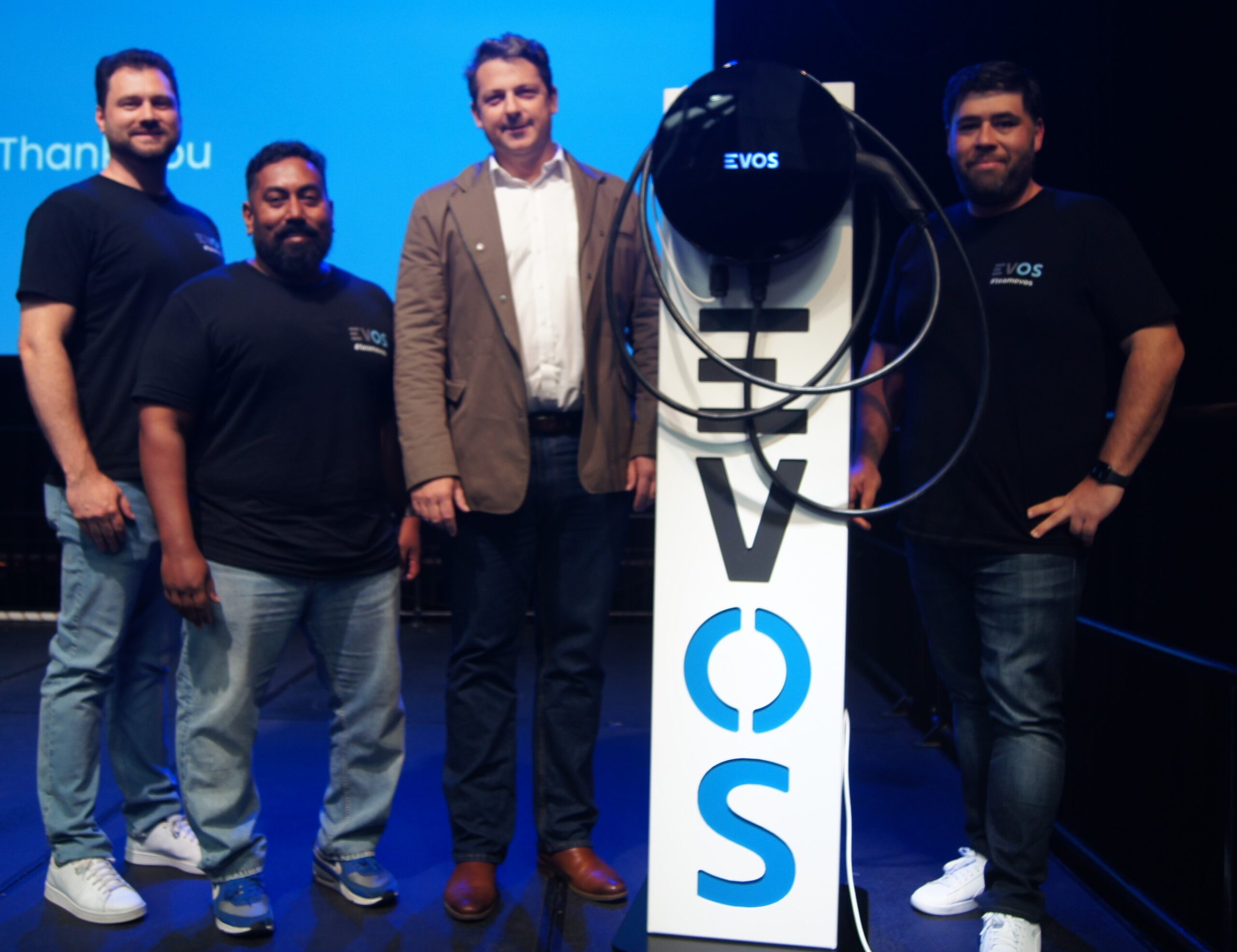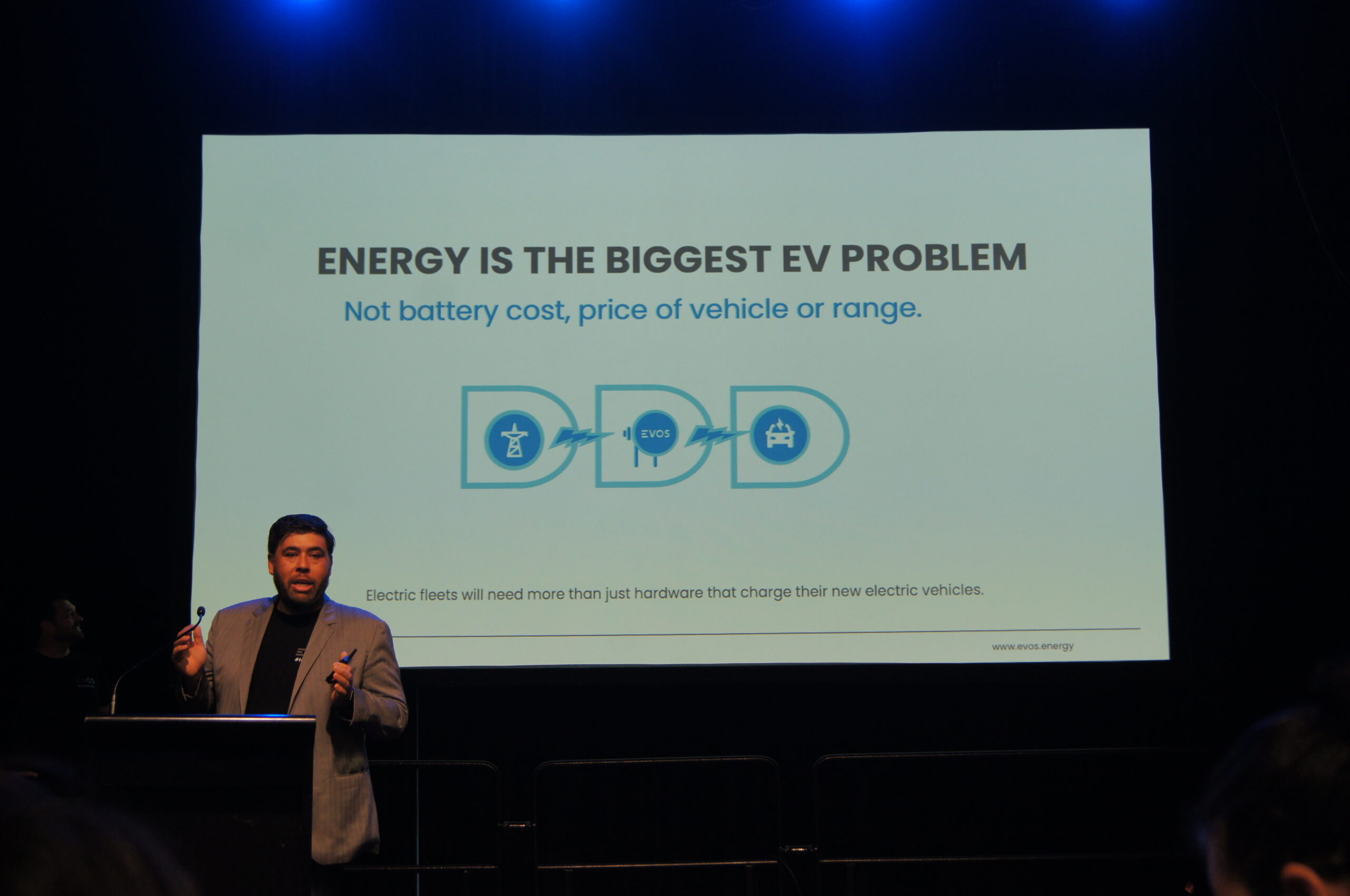
It was on the news! In our living rooms! On a commercial non-woke TV channel! Ampol is teeming up with EVOS to provide home chargers for electric vehicles. Ampol and EVOS. And, yes, this is a big deal. Although the news item only lasted 1 minute, it provided some tantalising information.
Ampol, Australia’s largest transport fuels provider, will act as the national distribution partner for EVOS and the SB7 EV Charger, in addition to EVOS’s Fleet Home22 Charger which was released last year. Both chargers will be available to the public later this year.
On Wednesday night, the item aired on the Channel 10 news at 13 mins in. The EVOS SB7 EV charger will be rolled out at most Ampol service stations by the end of the year. There are 1852 Ampol “gas” (we call it petrol here) stations throughout the country. That’s a lot of sites where you will be able to buy a charger.
The SB 7 is designed and manufactured in Australia and will sell for less than AU$2,000 per device. Jim Myatt, Ampol Energy CEO, says: “If you are out and about in shopping centres, we will have chargers in shopping centres. We will have chargers in our service sites more and more.” What’s next — will we be able to buy a charger at Bunnings or Big W? Why not?
In-built software in the SB7 will enable you to charge your car at the cheapest rate — be it overnight in non-peak periods, during business hours, when feed-in tariffs are at their lowest, or to leverage solar or battery power, for instance.
From another Ampol spokesperson: “We commenced the rollout of our electric vehicle (EV) charging network, AmpCharge last year as part of our e-mobility strategy to reduce emissions in the transport sector, assist in minimising range anxiety for EV owners and support EV uptake. To date, Ampol has deployed 40 EV charging bays at 17 sites across Australia. This makes up part of our national commitment to install EV charging infrastructure at more than 100 sites with over 300 charging bays to be delivered throughout 2023-24. We are excited to partner with EVOS to launch a home charging product, to be made available later in 2023, as part of our wider EV strategy to power customer journeys on the road and at home.”
A lot has happened since I reported last on Ampol’s charging deployment, growing from 5 to 17 sites.
The partnership with Ampol will enable EVOS to make a significant impact on the charging eco system. It will certainly be easy to obtain a home charger. Two years ago, I covered its launch, when it was targeting fleets with its easy-to-install and -uninstall fleet home chargers. I enquired of CEO Marcelo Salgado how sales were going.
“We aren’t able to give you specific numbers just yet, but sales of the Fleet Home 22 AC Charger have exceeded our expectations,” he said. “We’ll see more sales as well once Ampol’s direct-to-customer website launches later in the year, with both the Fleet Home 22 and the SB7 available for purchase then.”
The SB7 home charger was launched at the Gallery of Modern Art in Brisbane two days ago amidst much fanfare. It is a 7kW AC charger that can add 35 km of range for every hour of charging time, making it the ideal solution to ensure an EV is charged to meet daily driving needs. The press release was picked up and published across our broad brown land.
“The charger is Wi-Fi connection capable, ensuring EVOS and/or the homeowner can monitor and control the charger, while software updates can be made over-the-air (OTA) to keep the charger constantly on the cutting edge. It employs an end-to-end VPN, enabling a private and encrypted network that robustly safeguards user privacy.” The EVOS driver app allows drivers to monitor the SB7 and the cost of EV charging. The free app allows users to set up different charge schedules, while the SB7 can be integrated to the EVOS Grid Integration Device (GID — to be available early-2024) and enable drivers to utilise their energy better by choosing between solar or battery charging, providing dynamic load management and optimising tariff selection.”
“The SB7 is equipped with cutting-edge safety features, such as its welding detection capability which allows the device to detect a permanently engaged switching contact, which could put live AC voltage on the charge cable. Not only can the SB7 detect this scenario, but it can also notify the cloud platform of the safety issue, and the charger can disconnect itself from the grid until the safety issue is rectified.”
“We’ve designed this not only from the view of ‘how do we charge a vehicle’, but also from the view of the customer,” said EVOS CEO and co-founder Marcelo Salgado. “We asked ourselves what the EV owner needs from a charger: it has to be easy to install with no restrictions as to where it can go on a property, be easy to monitor remotely and help them manage their costs in an era when everyone is concerned with energy prices, and it has to look good.
“The SB7 ticks all of those boxes and more.”
The EVOS co-founders wanted to address the issues hindering EV uptake.
“The biggest issue for electric vehicle owners, fleet operators and strata companies is not the charging, but the management of energy,” said Chief Technology Officer and co-founder Chris Crossman. “Each of those segments features their own unique challenges, but the challenge that unites them all is the energy piece: namely, is there a way to optimise energy and lower costs amid soaring energy prices?
“We’ve looked to address this in our technology roadmap, while ensuring that these sub-sectors and their unique challenges are addressed with each product iteration, including the SB7.”

The SB7 has been built to withstand the harsh Australian elements. Constructed with UV-stabilised ABS plastic, the EVOS charger is designed to withstand the Australian sun and weather. This material not only offers an aesthetically pleasing look but also houses the electronic components in an IP65-rated enclosure, proving its strength in adverse conditions.
“EVOS designs and manufactures EV charging products in Brisbane, Australia to deliver quality, performance and innovation to the world. Its team of talented engineers and designers are constantly pursuing disruption through innovation and smart design. Its people are driven by the values of quality, simplicity and providing unrivalled customer experience.
“Following a $1.7m initial capital raise in July 2021, the company began production of its first product and, in November 2021, the company unveiled its Fleet Home 22 AC Charger and its energy management platform. The charger was designed to increase reliability and to simplify the charging experience for fleet operators, which need to negotiate power purchases, manage peak electricity loads, report on emissions savings, install electrical equipment and more.”
Since that initial raise, the company expanded its team to 22 and began developing its roadmap further.
“Solving that issue for fleet operators proved to the market that we understand the challenges faced by EV drivers, and that we understand how to address them,” said Chief Experience and Innovation Officer Seshan Weeratunga. “The SB7 resolves a number of headaches for EV owners, and the next products on the EVOS horizon will equally address the pain points EV drivers face across the country and, soon, abroad.”
EVOS now has two advanced chargers on the market, with more to come.
I don’t like paywalls. You don’t like paywalls. Who likes paywalls? Here at CleanTechnica, we implemented a limited paywall for a while, but it always felt wrong — and it was always tough to decide what we should put behind there. In theory, your most exclusive and best content goes behind a paywall. But then fewer people read it! We just don’t like paywalls, and so we’ve decided to ditch ours. Unfortunately, the media business is still a tough, cut-throat business with tiny margins. It’s a never-ending Olympic challenge to stay above water or even perhaps — gasp — grow. So …
Sign up for daily news updates from CleanTechnica on email. Or follow us on Google News!
Have a tip for CleanTechnica, want to advertise, or want to suggest a guest for our CleanTech Talk podcast? Contact us here.
Former Tesla Battery Expert Leading Lyten Into New Lithium-Sulfur Battery Era:
CleanTechnica uses affiliate links. See our policy here.







